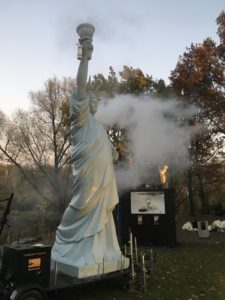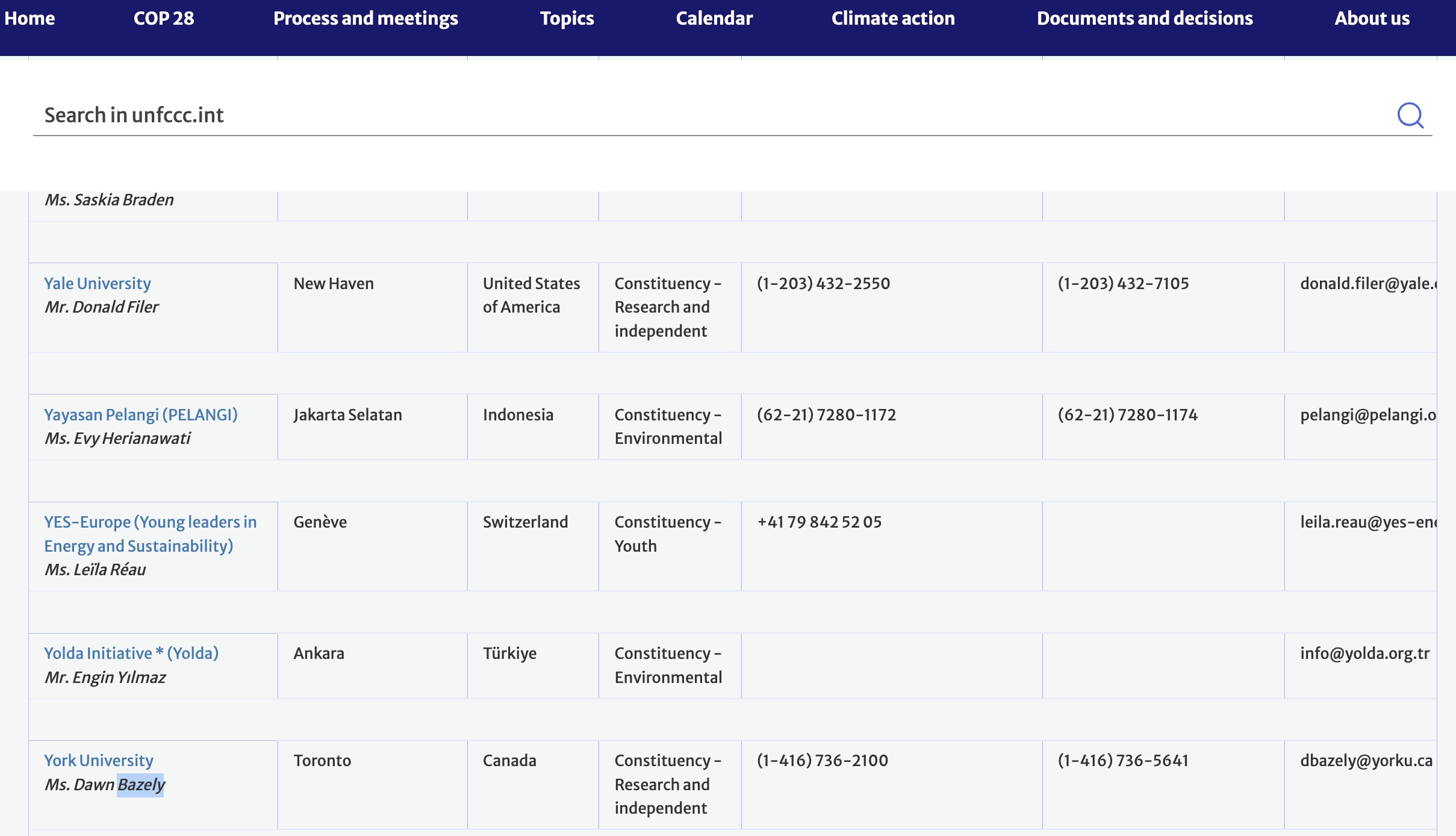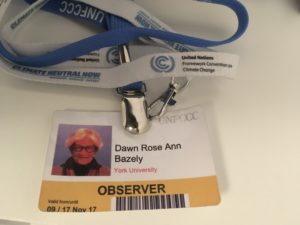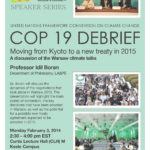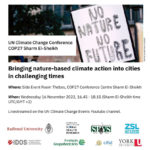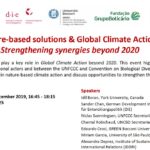You may have stumbled across recent newspaper articles stating that 2023 was the hottest year on record since humans have tracked temperatures. Should you be alarmed? Without a doubt, yes, especially since scientists have long warned about these climatic changes if greenhouse gas emissions were not curbed.
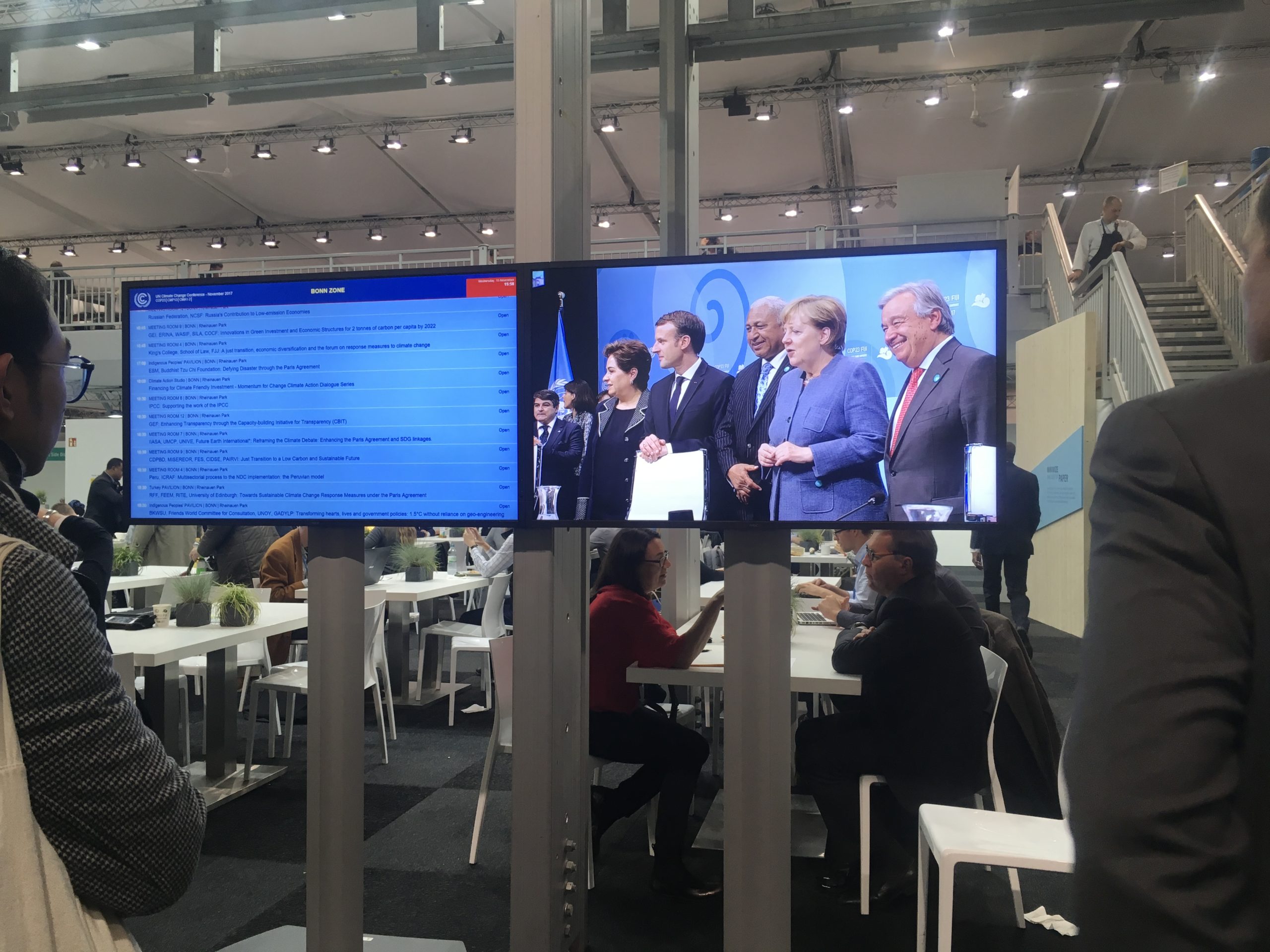
COP23 was too packed for observers to see world leaders in person in the plenary, plus security was high, so they appeared on in-house screens
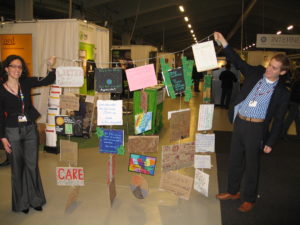
Annette Dubreuil (left) and fellow YorkU delegation member at the IRIS booth at COP15 in Copenhagen, 2009
The planet's main hope for slowing anthropogenic (human-caused) climate change and mitigating its worst impacts on people and biodiversity lies with the various environmental agreements hammered out at the United Nations. Since COP15 (pictured right), York University has been sending scholars -- students, professors and staff -- to bear witness to these negotiations, both at the annual full meeting of the signatories to the climate change convention (the COP) and the annual subsidiary body meetings (the SB) at which country delegates meet to organize the COP, and to study them. We have also extended observer badges to deserving members of civil society who would otherwise lack a means of attending a climate change COP.
For only the second time since 2009, in 2023, York did not send a delegation to the UNFCCC COP, although we followed the proceedings from afar. The stakes were high at COP28, which hosted the first Global Stocktake (GST). All eyes were on this COP due to worries of OPEC countries’ influence in the negotiations. In the end, COP28 delivered a compromise deal with ambiguous language regarding the phase out of fossil fuels. The outcome has been met with trepidation by scientists and organizations concerned with human rights.
Opportunities for UNFCCC participation by the YorkU Community are not increasing in line with increased interest in the main Climate Change negotiation space
There have been thirteen COPs since Dawn obtained observer status for York University’s first delegation during 2008 to 2009. During this time there has been plenty of drama, including COP25 being relocated from original host, Chile, to Spain, due to political unrest, and COP26 in Glasgow being postponed for a year due to the emergence of the Covid19 pandemic in 2020. We witnessed the complex mechanics of organizing a massive hybrid in-person and virtual meeting during an ongoing pandemic. COP26 was hosted by the UK in 2021.
During this time, the total number of accredited observer organizations across the nine constituencies of civil society attending the COPs has increased massively. As a result, delegate badges are becoming increasingly difficult to score, simply because there is a physical limit on the size of the meetings. As an accredited institution, York University has been given a smaller and smaller allotment of badges.
To recap, COP28 was the 2023 annual general meeting, or Conference of the Parties: the countries that have signed onto the UNFCCC. This massive annual meeting is attended by delegations from the member states and a host of other groups from civil society, the “observers”. At the annual COP there are two zones or spaces, the blue and the green. The COP28 website explained that the blue zone is for delegates with credentials (country reps, press, designated observers) and Heads of State, while the green zone is more open and inclusive, and often has art exhibits.
In the lead up to the COP, which usually takes place in November or December, Dawn receives many inquiries from colleagues and students at York University and from people across the globe, asking if they can get an official delegate badge for the COP.
Dawn gets these emails because she is Designated Contact Point (above). She was originally called the Designated Focal Point, but that title changed several years ago. Nevertheless, she has been the main YorkU person (in addition to the university president) in the UNFCCC Secretariat phone book, since she applied for Observer Status for York University. That process began in 2008, with observer status obtained in time to send delegates from York to COP15 in Copenhagen. One of her tasks in this role is to keep track of the schedules laid out by the UN Climate Change Secretariat.
Many of the emailed inquiries arrive in Dawn's inbox too late. The process in which members of civil society apply for the badges (right) to give them admission as an observer, begins around May of each year, when the UNFCCC Secretariat, headquartered in Bonn starts the clock ticking on the timeline.
Prof. Idil Boran (below) has attended more UNFCCC COPS and SBs in person, than any other member of the YorkU community. She has been the designated Head of Delegation since attending her first COP in 2012. Idil has participated in a total of 18 meetings of the UNFCCC. Of these, nine were Conferences of the Parties (COPs), eight were meetings of the Subsidiary Bodies, and one was a meeting of the Executive Committee of the Warsaw International Mechanism on Loss & Damage associated with climate change impacts.
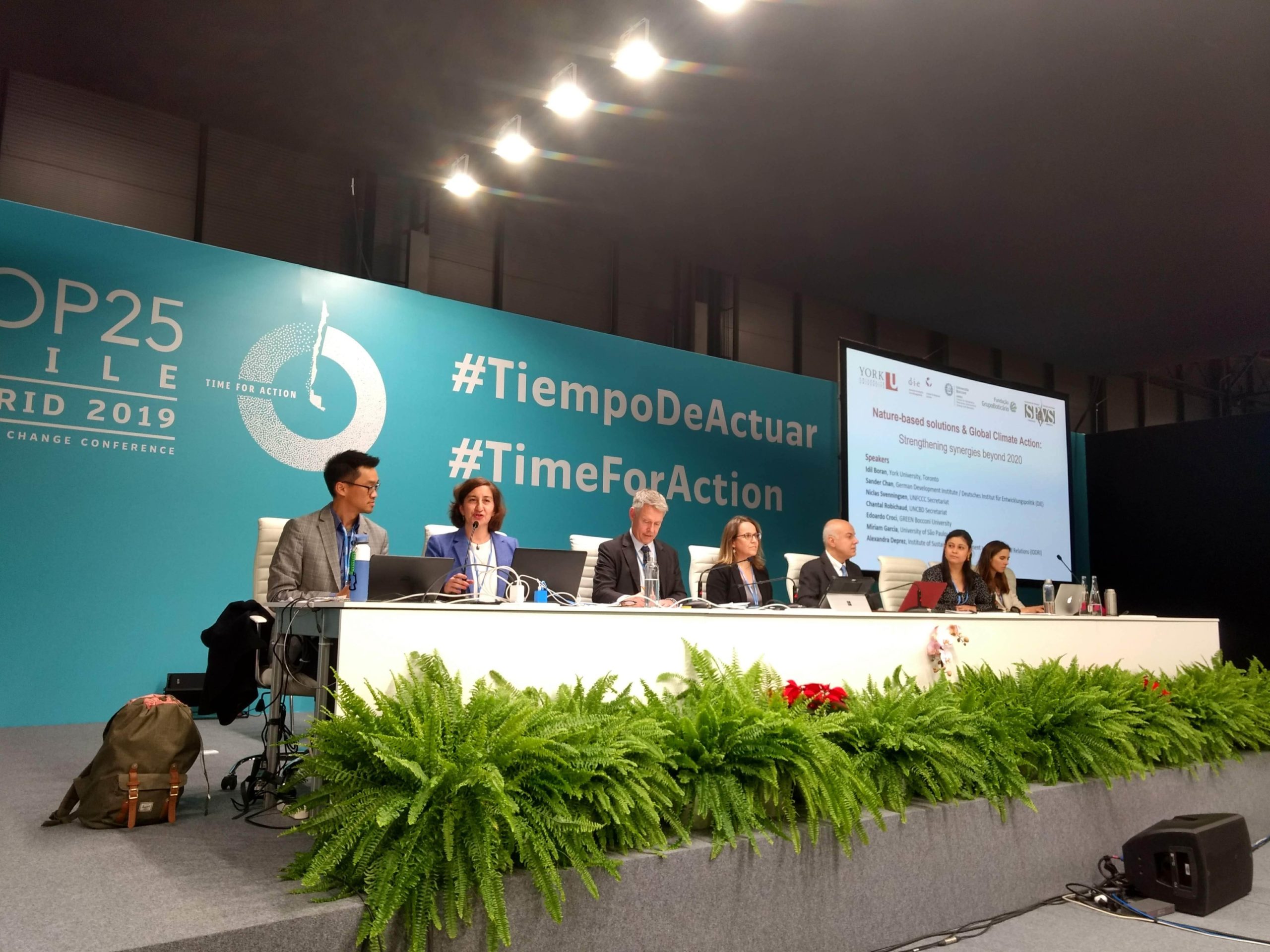
Prof. Idil Boran (second from left) at her Side Event panel at COP25, Spain, 2019 (photo credit: Prof. C. Hoicka)
During this time, Idil led over 35 onsite activities, ranging from observing and reporting to hosting and delivering official side events. She led or co-led a total of eight official side events since 2016 collaboratively with international partners. The side events were distinguished by their high representation of women and participants from the Global South. They have received praise from the UNFCCC Secretariat for their diversity and inclusion. Idil has also represented York University through speaking roles in various other side events and at UNFCCC’s Climate Change Studio.
After all of this, we consider ourselves to be an experienced duo when it comes to navigating the complex bureaucracy of the United Nations!
The rest of this post explains why, after all these years, Professors Dawn Bazely and Idil Boran decided to adjust our approach, in light of the pressures on the physical spaces where the UNFCCC COPs are held, and the demands for credentials. We explored ways of expanding the opportunities for the York University community to interact with United Nations processes where climate change conversations happen.
Expanding Opportunities for participation by YorkU Community Members at United Nations Climate Change-Adjacent Spaces
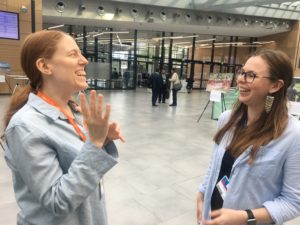
Dr. Nyssa Trip (left) presented some of her doctoral research done in the Faculty of Environment and Urban Change at the IPBES 10th Plenary
Because of the rising demand for UNFCCC COP delegate badges, in December 2022, Dawn and Idil embarked on a mission to expand York University’s observer presence at other meeting spaces within the UN environment system. In spring 2023, we spent the limited time off the side of our desks (successfully) pursuing observer status for IPBES – the Intergovernmental Platform on Biodiversity and Ecosystem Services. We are currently seeking observer status for the Convention on Biological Diversity (CBD).
Our thought process for why to expand York University's stakeholder observer status to IPBES and CBD meetings was thus:
- The One Planet, One Health framework views the intersectionality of climate change and biodiversity as essential to providing workable solutions, including Nature-based Solutions (NbS) to these wicked problems.
- York University is applying for more, but receiving fewer, delegation spots from the UNFCCC Secretariat, so it makes sense to gain observer spots at related UN spaces.
- IPBES and CBD are inviting and prioritizing Indigenous participation, with many opportunities for participation. We support these calls and view them as being aligned with York University's institutional goals related to the Truth and Reconciliation Calls to Action from 2015.
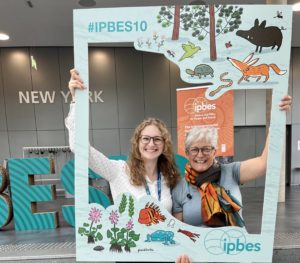 We hope you will join us at future meetings of the UNFCCC SBs and COPs, as well as CBD COPs and IPBES meetings. We will be further streamlining our process for opportunities to engage the UNFCCC, CBD and IPBES processes. We look forward to collaborating with you, and we encourage you to also follow public announcements from the Secretariats about the deadlines so we can coordinate your nomination in time.
We hope you will join us at future meetings of the UNFCCC SBs and COPs, as well as CBD COPs and IPBES meetings. We will be further streamlining our process for opportunities to engage the UNFCCC, CBD and IPBES processes. We look forward to collaborating with you, and we encourage you to also follow public announcements from the Secretariats about the deadlines so we can coordinate your nomination in time.
Professors Dawn Bazely (Biology) and Idil Boran (Philosophy)


